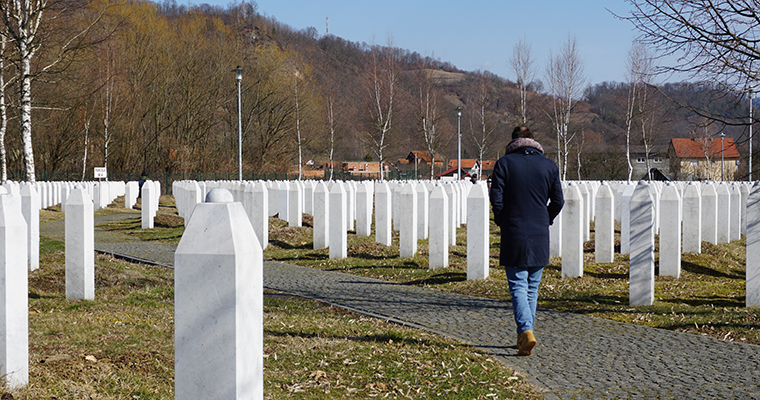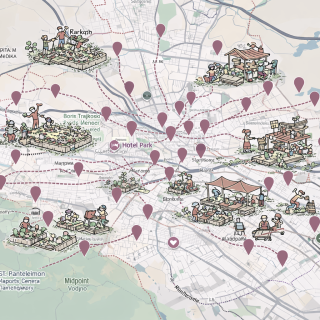There’s nothing more horrifying in the recent history of the Balkans than July 1995 and Srebrenica. No matter how you personally choose to define “horrifying,” “recent history,” and the terms “we” and “us.”
Almost everyone active in politics and media in the Balkans, among the creators of public opinion, is deeply aware of this fact.
Therefore, every abuse of this tragedy is even more malicious.
The painful paradox is that the topic of the Srebrenica genocide is more politically toxic and deadly in 2024, when a resolution is being adopted in the UN General Assembly, than it was in 2007, when a verdict was passed deciding Serbia’s responsibility for the genocide in Srebrenica. Except this is not a paradox; it is the result of the unsuccessful policy of forgetting and the subsequent very successful policy of instrumentalizing everything dead or alive for the survival of the organizers of the All-Serbian Congress in 2024.
I don’t use words and terms very sensitively because everything has already been said in the correct language. Survivors of the genocide have spoken, the victims’ families tirelessly speak of it, witnesses have testified, some perpetrators have confessed, peace activists have informed the public and appealed to conscience and empathy—various courts, from The Hague to Belgrade, have documented this in their processes to varying degrees. Artists have dramatized and filmed it, historians, forensic experts, lawyers, journalists, and various other professionals have processed this topic from their perspectives.
And politicians?
Politicians who have arrogantly assumed the right to represent the Serbian people have gathered in Belgrade at the All-Serbian Congress. Aleksandar Vučić, Milorad Dodik, remnants of Montenegro’s Democratic Front, the Serbian Orthodox Church—they have reincarnated the idea of Greater Serbia, the Serbian World, with the same ideological support but different mechanisms. The denial of the genocide in Srebrenica has gained a new interpretation, in which Serbs are actually the biggest (and only) victims.
For years, I have felt great shame and discomfort because of how the regime media in Serbia commemorate the anniversary of the attack on Aleksandar Vučić in Potočari on July 11th, while not mentioning the funeral or the commemoration. There is no information or reminder of what happened in and around the protected enclave of Srebrenica during those hot July days in 1995. We in Serbia have become accustomed to denying crimes, twisting the truth, accustomed to lies and various manipulations. But portraying Vučić as the great victim of July 11th surpasses it all.
And now it has gone a step further, depicting the Serbian people as the supposed victims of Srebrenica, and expressing reverence for the victims of genocide as an attack on the Serbian people and Serbian national identity. Because of this perceived threat, Serbs are forced to unite and gather.
Is this the closing of the circle? If Ratko Mladić placed the operation in Srebrenica in the context of “revenge against the Turks,” will Srebrenica again become a victim of revenge against the “collective West,” as they now talk about renaming the town of Srebrenica, which could easily become a pretext for a new violent change of ethnic structure. Or is it already happening?
They haven’t been sitting idly by; rather, with simultaneous action, they opened new lines of division among the peoples in the region. Dodik and Republika Srpska are threatening with a “dissolution agreement,” encouraged by support from Moscow and Belgrade. In Montenegro, Mandić obtained parliamentary support through blackmail for adopting a Declaration on the genocide in the Jasenovac, Dachau, and Mauthausen camps, evidently written overnight and deeply offensive to the victims of the The Independent State of Croatia. This hastily written and adopted Resolution achieved both its primary and secondary goals: the EU integration process has again been halted, just days after gaining significant momentum with confirmation of meeting interim benchmarks in key chapters, and European Council President Charles Michel canceled his visit to Podgorica. The other goal was to “equalize the victims” after Montenegro supported the UN General Assembly’s Declaration on the genocide in Srebrenica; now, Serbian victims have their resolution. The policy based on manipulation about the endangerment of Serbs and Serbian identity has gained particular momentum and will likely have new consequences in the form of government reconstruction, constitutional changes, and further sabotage of Montenegro’s Euro-Atlantic orientation.
Serbia is suppressing critical voices even more drastically, with the ban on the “Mirëdita, Dobar Dan” festival, escalating the usual attacks on peace activists and civil society advocating for regional cooperation. “A Shiptar won’t walk through the city,” could be heard at the protest against the festival, with the vocal-choral ensemble of state policy chanting and lighting flares, while their uniformed colleagues from regular units stopped the bus with festival participants and guests before entering Belgrade and escorted them back to the Kosovo border. But they did parade in Prijedor, where cadets of the Serbian Military Academy marched.
This chronology of events already seems frightening, even though it is incomplete. The statements and narratives accompanying these events, the constant threat of war wrapped in calls for peace, no longer disturb anyone because we have become so accustomed to it. Hatred towards our neighbors, towards the West—it has become a common place, strongly felt even in the commentary of football matches during the European Championship on public service broadcasts. And as if we didn’t have enough myths and nationalist manipulations, yet another myth has been established—that of Serbs as the victims of Srebrenica.
It began with absolute silence about Srebrenica. The next phase was, “There was no genocide in Srebrenica, but a grave, terrible crime was committed, and the culprits must be held accountable.” Then, “Yes, there was a crime in Srebrenica, but what did they do to us in Podrinje, it was just a response.” With some further modifications, we have reached this point. Srebrenica no longer symbolizes the genocide in which over 8,000 people were systematically killed to achieve Serbian war aims. It no longer symbolizes a crime. It doesn’t even symbolize a place name anymore, that little town in eastern Bosnia. When you say Srebrenica in Serbia in 2024, it refers to the Declaration, to the malicious politics of evil Western powers that want to harm Serbia and the Serbian people.
All these processes have brought to the public forefront the issue of the concept of collective responsibility. I cannot provide a theoretical, ethical, or practical analysis of this concept. But I know what drives every personal feeling, reflection, and activism of mine. It is the video of Ratko Mladić’s statement to the camera, in which he gives Srebrenica to the Serbian people on July 11, 1995. With endless compassion for the victims and their families, I feel tremendous anger that Ratko Mladić involved me in his criminal activities in this way. Therefore, I feel responsible because he passed the ball into our court. The same is being done today by the self-proclaimed leaders of the All-Serbian World. And that’s why I’m angry.
Ivan Đurić is an activist from Belgrade, engaged for over 15 years on issues of regional cooperation and reconciliation. He is a dedicated advocate of Euro-Atlantic integration for Serbia and the entire Western Balkans. He spent ten years with the Youth Initiative for Human Rights.
Translated by Luna Đorđević




